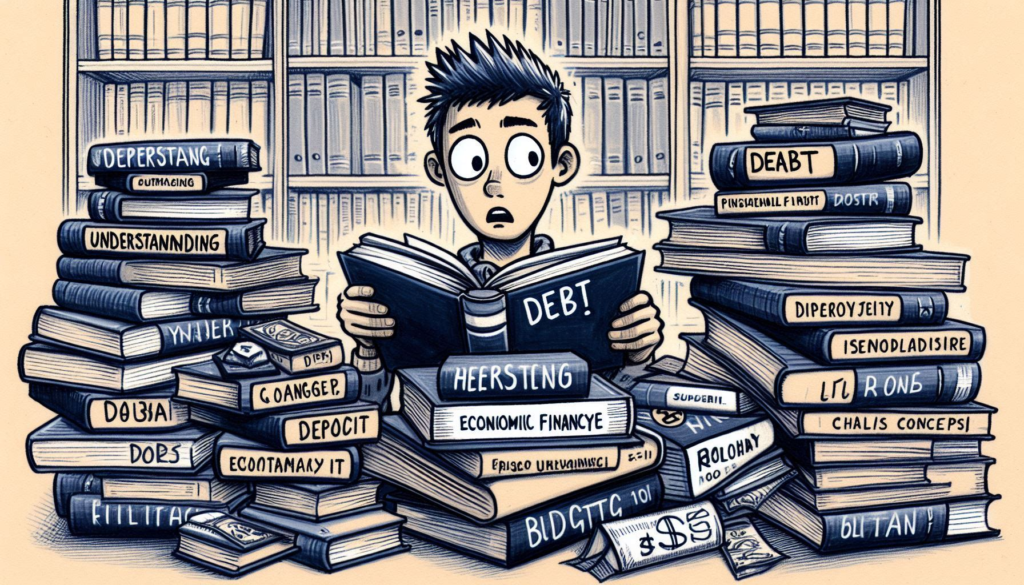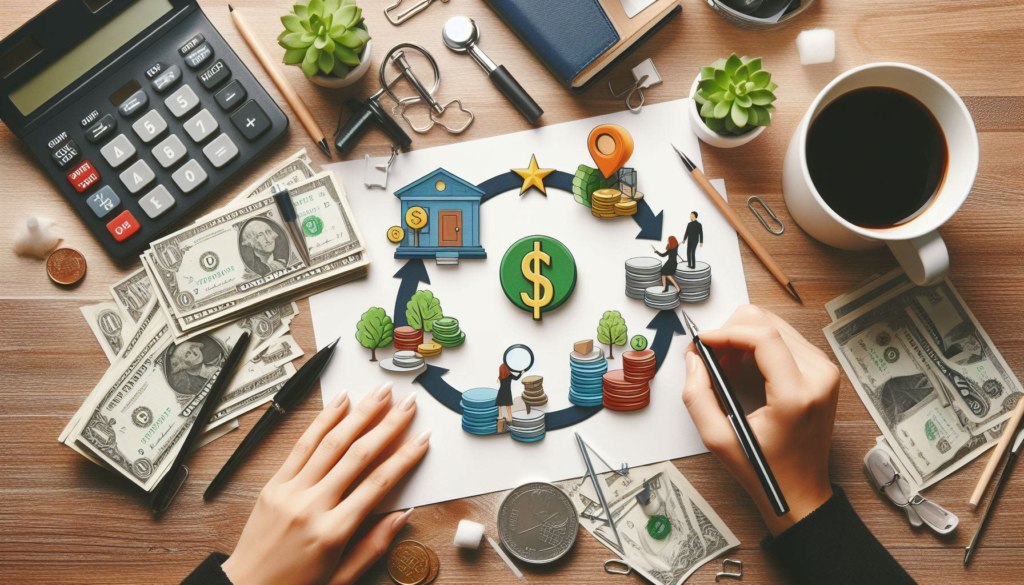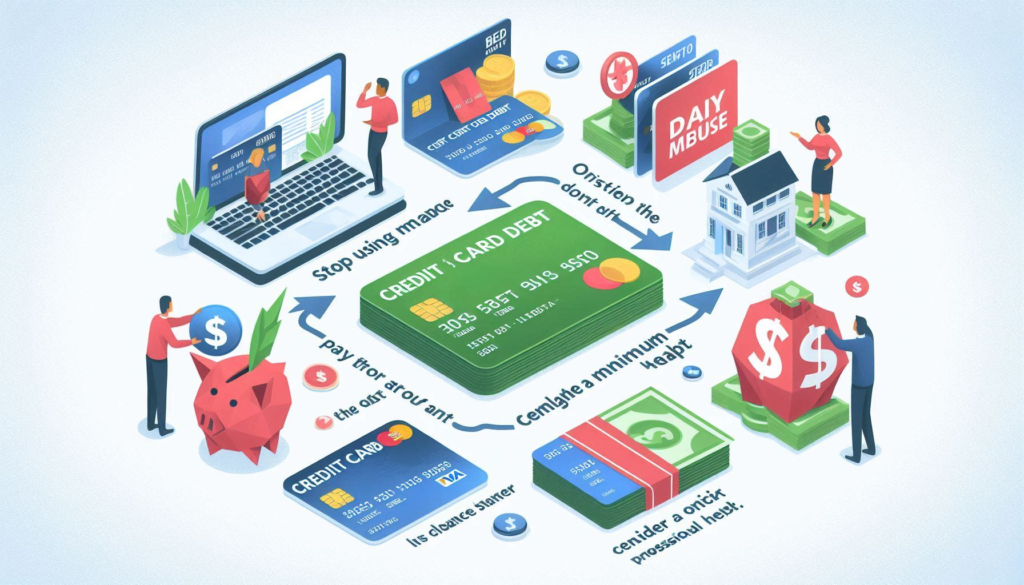Debt. It’s a word that can send shivers down your spine. It’s like a shadow that follows you around, constantly reminding you of the money you owe. But what exactly is debt?

In simple terms, debt is money that you owe to someone else. This could be a bank, a credit card company, or even a friend or family member. When you borrow money, you’re taking on debt. And with that debt comes the obligation to pay it back, often with interest.
But not all debt is created equal. There’s “good” debt and “bad” debt. Good debt is an investment that will grow in value or generate long-term income. Taking out a mortgage to buy a home, for example, is often considered good debt. On the other hand, bad debt is something that quickly loses its value or does not generate income. Credit card debt is a prime example of bad debt.
Understanding the difference between these types of debt is crucial. It’s not just about how much debt you have, but also what kind of debt you have. And most importantly, it’s about understanding how to manage your debt effectively.
So, why should you care about living a debt-free life? Well, imagine a life where you’re not constantly worrying about making your next credit card payment. A life where you can make decisions based on what’s best for you, not what’s best for your creditors. That’s the power of living a debt-free life.
But getting there isn’t easy. It takes discipline, commitment, and a solid plan. But don’t worry, we’re here to help. In this article, we’ll guide you through the steps to live a debt-free life and how to eliminate credit card debt quickly.
Remember, becoming debt-free isn’t just a financial decision. It’s a lifestyle choice. And it’s a choice that can lead to a life of financial freedom and peace of mind. So, are you ready to take the first step towards a debt-free life? Let’s get started.
The Impact of Debt: Emotional and Financial Consequences
Debt. It’s not just a number on a piece of paper or a figure on a screen. It’s a weight that can bear down on you, affecting every aspect of your life. Let’s delve into the emotional and financial consequences of debt.

Emotional Consequences
Debt can take a significant toll on your mental health. The constant worry about paying off your debt can lead to stress and anxiety. You might find yourself lying awake at night, your mind racing with thoughts about your financial situation. This chronic stress can lead to other health problems, such as headaches, heart disease, and even depression.
Moreover, debt can strain your relationships. It can lead to arguments with your spouse or partner about money, and it can make you feel embarrassed or ashamed, causing you to withdraw from friends and family.
Financial Consequences
The financial consequences of debt are equally severe. When you’re in debt, a significant portion of your income goes towards paying it off. This leaves less money for other things, like saving for retirement or a child’s education.
Debt can also affect your credit score, making it harder to get loans in the future. And in extreme cases, it can lead to bankruptcy, which can have long-lasting effects on your financial health.
But here’s the good news: no matter how much debt you have, it’s possible to overcome it. It won’t be easy, and it won’t happen overnight. But with a solid plan and a commitment to change, you can break free from the cycle of debt and start living a financially healthy life.
Steps to Live Debt Free
Living a debt-free life might seem like a distant dream, but it’s more attainable than you might think. With a bit of planning, discipline, and determination, you can take control of your finances and start your journey towards financial freedom. Here are some steps to help you live a debt-free life.

Creating a Budget
The first step towards living a debt-free life is creating a budget. A budget is a plan for how you’ll spend your money each month. It helps you understand where your money is going and identify areas where you can cut back. Start by listing all your income and expenses. Then, categorize your expenses into needs, wants, and savings or debt repayment. This will give you a clear picture of your financial situation and help you make informed decisions about your spending.
Building an Emergency Fund
An emergency fund is a safety net that can protect you from unexpected expenses. Without one, you might have to rely on credit cards or loans to cover emergencies, which can lead to more debt. Aim to save at least three to six months’ worth of living expenses in your emergency fund. It might take some time to build up, but having this financial cushion can give you peace of mind and keep you from falling back into debt.
Paying Off Debt
Once you have a budget and an emergency fund in place, it’s time to start paying off your debt. There are several strategies you can use, like the debt snowball method (paying off debts from smallest to largest) or the debt avalanche method (paying off debts with the highest interest rates first). Choose a method that works best for you and stick with it. Remember, consistency is key when it comes to debt repayment.
Living a debt-free life is a journey, not a destination. It requires a shift in mindset and a commitment to change. But with these steps, you can take control of your finances and start living a life free of debt.
How to Eliminate Credit Card Debt Quickly
Credit card debt can feel like a mountain that’s impossible to climb. But don’t lose hope. With the right strategy and a bit of determination, you can conquer your credit card debt and regain your financial freedom. Here’s how:

Stop Using Credit Cards
The first step to eliminating credit card debt quickly is to stop using your credit cards. It might seem obvious, but it’s easier said than done. It’s tempting to rely on credit cards for everyday purchases, especially when cash is tight. But every time you swipe your card, you’re digging yourself deeper into debt. So, put your credit cards away, or even cut them up if you have to. Start using cash or a debit card instead. This will force you to live within your means and stop accumulating more debt.
Pay More Than the Minimum Payment
Paying only the minimum payment on your credit card bill is a trap. It keeps you in debt longer and costs you more in interest. If you want to eliminate your credit card debt quickly, start paying more than the minimum payment. Even a little bit extra each month can make a big difference. It will reduce your total debt and help you pay it off faster.
Consider a Balance Transfer
A balance transfer can be a useful tool in your debt elimination toolkit. It involves transferring your credit card balance to a new card with a lower interest rate. This can save you money in interest and help you pay off your debt faster. But be careful. Balance transfers often come with fees, and the low interest rate is usually a promotional rate that will increase after a certain period. Make sure to read the fine print and understand the terms before you proceed.
Seek Professional Help
If you’re overwhelmed by your credit card debt, don’t hesitate to seek professional help. Credit counselors can provide you with resources and tools to manage your debt. They can help you create a budget, offer advice on debt repayment strategies, and even negotiate with your creditors on your behalf.
Conclusion
And there you have it. The journey to a debt-free life may seem daunting, but remember, every journey begins with a single step. And you’ve already taken the first step by educating yourself about debt and how to overcome it.

Living a debt-free life is more than just paying off your debts. It’s about changing your mindset towards money. It’s about understanding the value of money and the freedom that comes with being in control of your finances. It’s about making informed decisions that will benefit you in the long run.
Remember, becoming debt-free is not an overnight process. It requires discipline, patience, and perseverance. There will be challenges along the way, but don’t let them discourage you. Keep your eyes on the prize – a life free of financial stress and full of possibilities.
So, are you ready to embrace a debt-free lifestyle? Are you ready to take control of your finances and start living the life you’ve always dreamed of? The journey may be long and challenging, but the destination is worth it. Here’s to a future free of debt and full of financial freedom!
